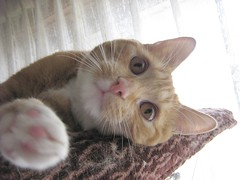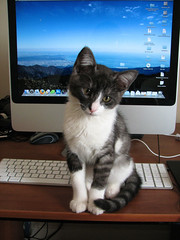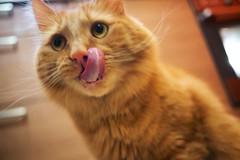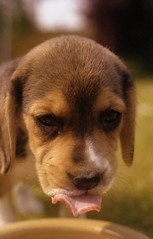Kidney failure in cats – how Chinese medicine and diet can help
Friday, March 4th, 2011 Food sitting in a dish uneaten does not help a cat get better.
Food sitting in a dish uneaten does not help a cat get better.
In other words, the best food left uneaten does nothing.
Yet many cats with kidney/renal disease are put on a low protein diet such as Science Diet’s K/D diet that they will not eat. And from my experience cats with renal disease should not be on K/D or other low protein kidney diets to began with.
Many cats get kidney failure as they age, yet western medicine does not have a good treatment to reverse or prevent this disease. The most common treatments involve a low protein diet and subcutaneous fluids.
So what do I recommend for cats with renal disease, if you know they do not have inflammatory kidney disease (explained later in this article)?
A high protein canned or home cooked diet made with good quality protein. I recommend using Instinct, Weruva, or Go/Now grain free if you use a commercial diet. Raw food is ok if they will tolerate it and are not severely sick.
 What high protein?!
What high protein?!
But my vet said I need to feed low protein!
Here is one of the commonly sited studies on PubMed that proves that high protein does not make kidney disease worse in cats.
Protein and calorie effects on progression of induced chronic renal failure in cats
So let’s talk a little about what is going on with renal disease and why I recommend the diets I do.
From a Chinese Medicine view we have two main types of renal failure, inflammatory and deficient/ischemic.
Deficient or ischemic kidney disease
This is the more common type of renal failure. These guys are usually thin, not great eaters and may or may not be vomiting. The inflammatory cats may also shift to this after you get the inflammation down.
I really hate to see these guys on K/D or low protein.
In this form of renal failure there is not enough blood going to the kidneys and the cells are dying from ischemia (lack of oxygen). They may also have renal hypertension (high blood pressure) which causes even more damage. Many of these cats are also anemic making the problem even worse.
These cats need protein both to increase blood flow and blood volume (you can’t make blood without protein) and to repair the damage to the kidney cells (you can’t repair cells without protein).
And yes many of these cells are not dead and can be repaired once you improve blood flow.
- I recommend a high protein canned food such as Instinct, or grain free Weruva or Go for these guys.
- I highly recommend acupuncture for deficient cats. They not only feel better, eat better but often we can reduce their kidney numbers or get them back to normal
- Infrared light therapy can be very helpful for these kitties and can be done at home. Infrared light helps to improve blood circulation into the kidneys and wake up kidney cells that are still alive but don’t have enough blood flow. See my article Infrared light therapy for instructions on how to use this therapy.
- I also often put these cats on a Chinese formula containing Shu Di Huang (also known as rehmannia). Shu Di Huang formulas help repair kidney cells, lower kidney numbers on blood work and lower blood pressure. It is best to find a holistic vet to help you determine the best formula. If you can’t find someone to help you the base formula Liu Wei Di Huang Wan can be used. This formula is now available in powder form that can be made into a tea from my etsy shop Kingdom of Basil
 I’ve had many cats convert back to normal through diet, acupuncture and herbs.
I’ve had many cats convert back to normal through diet, acupuncture and herbs.
From my experience, if they stay on K/D, I can not convert them back. They need to be on high protein if they have this type of kidney disease to improve numbers. If they are inflammatory we get rid of the inflammation and then put them on high protein even if the numbers are normal to keep them stable and out of renal failure.
Although it is not my favorite approach, I have maintained cats with ischemic renal disease on dry Orijen or high protein/no grain diets. If somehow they have to be on dry I always go with a high protein. They tend to stay stable on high protein dry and sub-Q fluids. I also find sometimes you need a little dry in the old guys. My old cat Basil needs a little dry to maintain his weight because he just didn’t eat enough canned.
So why does my western veterinarian recommend a low protein diet?
We do know that high phosphorus can be bad in renal disease. There is higher phosphorus levels in protein so it is hard to get low phosphorus without doing a low protein diet. So low phosphorus has translated into low protein. My experience has shown me that the higher phosphorus doesn’t seem to cause as large an issue as the low protein does in cats with kidney failure.
Inflammatory kidney disease
We do not see much inflammatory kidney disease in cats and most of it is in cats younger than 10 years old. In inflammatory kidney disease, there is inflammation in the kidneys that causes the the kidneys to not function well and reduces the blood flow to the cells.
 It can be hard to tell these cats from deficient kidney kitties as there is much overlap in symptoms. These cats tend to vomit a lot but still have a fairly good appetite. They almost always have a high cholesterol on blood work and tend to have kidney numbers that are just barely elevated. They also may have a history of inflammatory bowel disease, elevated liver enzymes, chronic pancreatitis or vomiting. And these cats tend to be younger, usually the old thin kitties are not inflammatory.
It can be hard to tell these cats from deficient kidney kitties as there is much overlap in symptoms. These cats tend to vomit a lot but still have a fairly good appetite. They almost always have a high cholesterol on blood work and tend to have kidney numbers that are just barely elevated. They also may have a history of inflammatory bowel disease, elevated liver enzymes, chronic pancreatitis or vomiting. And these cats tend to be younger, usually the old thin kitties are not inflammatory.
Usually with acupuncture and herbs we can clear this stage up in a month or two. If it is mild and recent their kidney numbers may go back to normal. If they have had it awhile we then see the ischemic renal disease underneath.
These guys should not have high protein but also should not have high grain (which causes inflammation).
- I recommend a normal to moderate protein canned food such as Avoderm, Pinnacle or Nature’s Variety Homestyle. High protein increases blood flow which will cause more inflammatory cells to go to the kidneys, we don’t want that but also we need some protein to maintain the cells
- I also recommend acupuncture for these cats to reduce the inflammation and support the kidneys
- For inflammatory kidney disease herbal treatment can be amazingly effective. It is best if you can work with a holistic vet to determine the most appropriate formula.
- 1. Find a holistic vet who can help to make that determination.A holistic vet can also help you get your cat on an appropriate herbal formula and do acupuncture to help support the kidneys .
- 2. If you can’t find a vet to work with, feed a moderate protein canned food.
- 1. Do not overvaccinate. We now know that the FVRCP causes many cats to have antibodies against their own kidneys. See the article To vaccinate or not to vaccinate that is the question.
- 2. Do not feed your cat a dry food only diet. Make sure your cat is on a high protein, good quality diet of canned food, home cooked or raw food. Cats on dry food only diets are always in a mild state of dehydration. Long term this dehydration can hurt their kidneys. See How do I pick the best food for my cat’s health.
So what do I do if I can’t figure out if my cat has inflammatory or ischemic kidney disease?
 What can I do to prevent kidney failure in cats who are currently healthy?
What can I do to prevent kidney failure in cats who are currently healthy?










